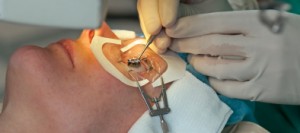Treatment/correction (without further surgery) for RK side effects/complications scleral contact lenses, RGP lenses, hybrid lenses, soft contact lenses, glasses)
Radial Keratotomy is a procedure to reduce nearsightedness in which tiny cuts are made in cornea to flatten it. The procedure is used for treating nearsightedness and astigmatism both. However, the problem with RK is that the results are not accurately predictable and thus there are occasionally complications and side effects specially over-correction or under-correction.
The vision correction by RK may also be unstable and mostly result in farsightedness after 10 years or so, called hyperopic shift.
Treatment for RK complications
Radial Keratotomy is not done very often anymore because of other options like laser surgeries available these days with less complications. However if you’ve developed any complications of the RK procedure, consult your doctor and get an expert opinion regarding your specific case and what are best management options available for your post RK complications.
Common vision related side effects of RK can be solved by:
Eyeglasses
High definition eye glasses are helpful in correcting minor refractive errors after the RK procedure such as minor under correction or minor over correction resulting in minor post RK nearsightedness or farsightedness respectively.
Toric soft contact lenses
Toric soft lenses are helpful in post RK patients when regular astigmatism is present. However they are not helpful in patients with irregular astigmatism as they’re unable to mask an irregular corneal surface.
Hybrid contact lenses
Hybrid contact lenses consisting of rigid gas permeable center with a soft contact lens skirt in peripheries is helpful in patients with irregular corneal surface and irregular astigmatism.
Rigid Gas Permeable contact lenses
Rigid gas permeable contact lenses don’t come in contact with the corneal surface e and thus are helpful in solving the vision issues due to irregular cornea.
Scleral Contact lenses
Scleral contact lenses don’t rest on the corneal surface, rather they rest on the sclera due to their larger diameter. They’re gas permeable therefore corneal hypoxia is prevented.
Scleral contact lenses are helpful in solving various corneal surface related vision issues and also dry eyes or other issues due to corneal irritation with conventional lenses.
Treating Dry eyes
Following manipulation of cornea in RK or other eye surgeries, the nerves sensation and thus the tears production might get disturbed resulting in dry eyes. Dry eyes treatment is necessary even if temporary to have better vision during the recovery phase. Dry eyes can be managed using scleral contact lenses, eye drops, punctal plugs, etc.
Complications following RK are common. However before jumping to conclusions and starting self-remedies, always consult the specialist to get an expert opinion regarding your specific case for best post RK complications treatment. Contact Dr. Irwin Azman for a Free Consultation.

